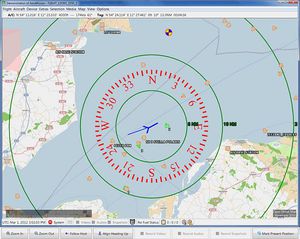THE Flight Management System (FMS) represents a major advance in the field ofmodern aviation. Designed to alleviate the workload pilots, it plays a crucial role in the planning and theexecution of flights. This system, integrating advanced technologies, makes it possible to calculate precisely the routes, to estimate the durations flight and adjust the path in case of necessity. In addition, by automatically correcting errors and optimizing the performance of flight, the FMS not only contributes to the safety air, but also to the operational efficiency of aircraft, thus underlining its importance in the management of air traffic flow.

The Flight Management System, commonly referred to by the acronym FMS, is a fundamental element of contemporary avionics. It was developed to alleviate crew workload and optimize the precision of flight operations. This article explores in depth the operation and importance of FMS in the modern aviation sector, highlighting its essential functions and its impact on flight safety.
Table des matières
ToggleDefinition and Functionalities of the FMS
THE Flight Management System is sophisticated software integrated into modern aircraft. Its main mission is to support the crew in planning, executing and monitoring flight paths. By enabling automated management, the FMS significantly reduces the cognitive load of pilots, allowing them to focus on critical tasks and strategic decisions.
The FMS works by collecting and analyzing data such as aircraft position, speed and trajectory. Using this information, it is able to carry out complex calculations to estimate travel times and optimize air routes. In case of anomalies in the planned trajectory, the system can automatically correct the flight by adjusting the navigation parameters, which guarantees better precision throughout the journey.
Importance of FMS in Modern Aviation
In the context of modern aviation, the FMS has become an indispensable tool for ensuring the safety and efficiency of flight operations. By streamlining the management of traffic flows, the system helps reduce the risk of human errors, which remain one of the leading causes of aviation accidents. This allows pilots to focus on features such as monitoring the flight environment and making real-time decisions, essential for safety.
In addition, the integration of the FMS in recent aircraft has made it possible to improve coordination between the different phases of flight, from takeoff to landing. The ability of the FMS to interact with other avionics systems, such as the autopilot and flight director, increases operational reliability and allows for better management of emergency situations.
Evolution and Future of Flight Management Systems
With the rapid advancement of technology, Flight Management Systems continue to evolve to meet the growing demands of aviation. New generations of FMS integrate advanced functionalities, such as dynamic route management, which make it possible to adapt routes in real time and optimize fuel consumption.
These technological advances contribute not only to better operational performance, but also to the environmental sustainability of aviation. Using cutting-edge algorithms and real-time weather data, the FMS can suggest the best routes, thereby reducing greenhouse gas emissions and improving the carbon footprint of the aviation sector.

























